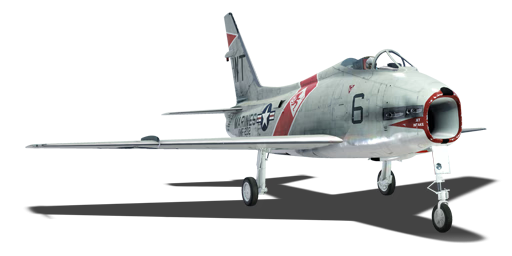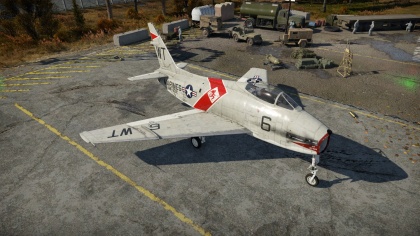FJ-4B VMF-232
Contents
| This page is about the aircraft FJ-4B VMF-232. For other uses, see FJ-4B or the Fury disambiguation page |
Description
The FJ-4B VMF-232 Fury is a gift Rank VI American jet fighter
with a battle rating of 9.0 (AB/SB) and 8.7 (RB). It was introduced in Update 1.79 "Project X" as the main reward for the Good Old S.U.M.M.E.R event 2018.
General info
Flight Performance
Describe how the aircraft behaves in the air. Maximum speed, manoeuvrability, speed and allowable loads - these are the most important characteristics of the vehicle.
Survivability and armour
Examine the survivability of the aircraft. Note how vulnerable the structure is and how secure the pilot is, whether the fuel tanks are armoured. Describe the armour, if there is any, also mention the vulnerability of other critical aircraft systems.
Armaments
Offensive armament
Describe the offensive armament of the aircraft, if any. Describe how effective the cannons and machine guns are in a battle, and also what belts or drums are better to use. If there is no offensive weaponry, delete this subsection.
Suspended armament
Describe the aircraft's suspended armament: additional cannons under the wings, bombs, rockets and torpedoes. This section is especially important for bombers and attackers. If there is no suspended weaponry remove this subsection.
Defensive armament
Defensive armament with turret machine guns or cannons, crewed by gunners. Examine the number of gunners and what belts or drums are better to use. If defensive weaponry is not available remove this subsection.
Usage in battles
Describe the tactics of playing in an aircraft, the features of using vehicles in a team and advice on tactics. Refrain from creating a "guide" - do not impose a single point of view, but give the reader food for thought. Examine the most dangerous enemies and give recommendations on fighting them. If necessary, note the specifics of the game in different modes (AB, RB, SB).
Pros and cons
Pros:
- Relatively high top speed
- Powerful cannons, and loadouts
- Good ground attack potential
- Good for researching other jets
- Has AGM-12B Bullpups air-to-ground missiles
- Can land on carriers with ease
Cons:
- Very inaccurate guns when stock
- Slow acceleration (especially when stock)
- Generally heavy, climb rate is generally poor with added ordnance
- Carrying ordinance significantly reduces performance
History
The FJ-4 was the fourth modification of the Fury - the naval version of the F-86 Sabre, serving primarily with the USMC. Being initially conceived as an all-weather interceptor, the FJ-4 Fury had to incorporate several design changes compared to the previous fighter version in order to fulfill this new role. The most notable change was the increase in range and the installation of new, thinner wing with an increased surface area. To achieve the range increase, the aircraft underwent several structural changes which reduced its weight and allowed for additional fuel tanks to be installed. Additionally, a more powerful Wright J65-W-16A engine, producing 7,700 lbf of thrust, was installed on the production versions. Following successful test flights, production of the FJ-4 commenced in 1955 with first units entering service with the Navy in 1956. Over 150 FJ-4 Fury interceptors were built.
Wishing to increase the strike capabilities of the new FJ-4, engineers of the North American company went back to the drawing board and once more applied several changes to the design, creating the FJ-4B. The FJ-4B version most notably featured a strengthened wing, offering an increased payload by adding two additional hardpoints to each wing, bringing the total up from two to six. Furthermore, the aircraft received air brakes under the aft of the fuselage, making dive bombing and landing easier. Of the original order for 221 FJ-4 Fury interceptors, the last 71 were modified into the FJ-4B fighter-bomber version. An additional order for 151 FJ-4B Furies followed in April 1956, bring the total of produced FJ-4Bs up to 222. Both the interceptor and fighter-bomber version of the FJ-4 served with the Navy and USMC until the early 1960s, before being phased out of active service and moved to the Naval Air Reserve. The FJ-4 was the last modification of the Fury and among the last mass-produced variants of the Sabre lineage.
- From Devblog
Media
An excellent addition to the article will be video guides, as well as screenshots from the game and photos.
See also
Links to the articles on the War Thunder Wiki that you think will be useful for the reader, for example:
- reference to the series of the aircraft;
- links to approximate analogues of other nations and research trees.
External links
| USA jet aircraft | |
|---|---|
| Fighters | |
| F9F | F9F-2 · F9F-5 · F9F-8 |
| F-80 | F-80A-5 · F-80C-10 |
| F-84 | F-84B-26 · F-84F · F-84G-21-RE |
| F-86 | F-86A-5 · F-86F-25 · F-86F-2 · F-86F-35 |
| F-89 | F-89B · F-89D |
| F-100 | F-100D |
| F-104 | F-104A · F-104C |
| F-4 | F-4C Phantom II · F-4E Phantom II · F-4J Phantom II · F-4S Phantom II |
| F-5 | F-5A · F-5C · F-5E · F-20A |
| F-8 | F8U-2 · F-8E |
| F-14 | F-14A Early · ▄F-14A IRIAF · F-14B |
| F-15 | F-15A · F-15C MSIP II · F-15E |
| F-16 | F-16A · F-16A ADF · F-16C |
| Other | P-59A · F2H-2 · F3D-1 · F3H-2 · F4D-1 · F11F-1 |
| Strike Aircraft | |
| FJ-4 | FJ-4B · FJ-4B VMF-232 |
| A-4 | A-4B · A-4E Early |
| A-7 | A-7D · A-7E · A-7K |
| AV-8 | AV-8A · AV-8C · AV-8B Plus · AV-8B (NA) |
| A-10 | A-10A · A-10A Late · A-10C |
| F-111 | F-111A · F-111F |
| Other | A-6E TRAM · F-105D · F-117 |
| Bombers | |
| B-57 | B-57A · B-57B |





